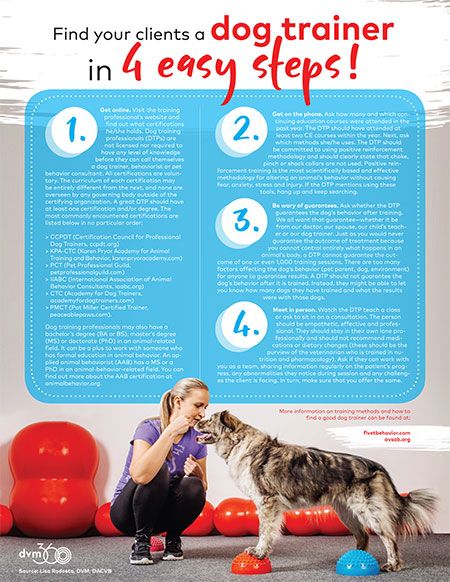Team tool: Help veterinary clients find a dog trainer in 4 easy steps
As a veterinary professional, you've probably witnessed poor training here, there, everywhere. Which is why you know that an experienced, qualified dog training professional is hugely valuable to dog owners and can make a world of difference for your canine patients. Use this tool to help lead veterinary clients in the right direction.
Take it from veterinary behaviorist and longtime dvm360 contributor Lisa Radosta, DVM, DACVB: A fantastic dog training professional (DTP) that you can readily recommend can be an asset to your veterinary healthcare team and can improve the welfare and wellbeing of your patients. On the other hand, recommending the wrong DTP can result in injuries to your patients, loss of clients' trust and poor quality of life for your canine patients.
And while you want to be the best source of information for your clients, you also know that sometimes pet owners are going to take matters into their own hands. Which is why we worked with Dr. Radosta to develop a veterinary team education tool to help you find your clients the right DTP.
Post this PDF flyer in your practice's breakroom as a good reminder for anyone on the team who might be in the position to recommend professional dog training. (Bonus-you can print it out as a poster, too!) Click to the next page to see the advice included on the poster.

1. Get online
Visit the websites of a few DTPs and find out what certifications or degrees they hold. DTPs are not licensed, nor are they required to have any level of knowledge before they can call themselves a dog trainer, behaviorist or pet behavior consultant. All certifications are voluntary. The curriculum for one certification may be entirely different from the next, and none are overseen by any governing body outside of the certifying organization. A great DTP should have at least one certification or degree. The groups offering the most commonly encountered certifications are listed below in no particular order:
• CCPDT (Certification Council for Professional Dog Trainers, ccpdt.org)
• KPA (Karen Pryor Academy for Animal Training & Behavior, karenpryoracademy.com)
• PPG (Pet Professional Guild, petprofessionalguild.com)
• IAABC (International Association of Animal Behavior Consultants, iaabc.org)
• The Academy for Dog Trainers, academyfordogtrainers.com
• PMCT (Pat Miller Certified Trainer, peaceablepaws.com).
Dog training professionals may also have a bachelor's degree (BA or BS), master's degree (MS) or doctorate (PhD) in an animal-related field. It can be a plus to work with someone who has formal education in animal behavior. An applied animal behaviorist has an MS or a PhD in a field related to animal behavior. (There are also Certified Applied Animal Behaviorists, and you can learn more at animalbehavior.org.)
2. Get on the phone
Ask how many and which continuing education courses the DTPs attended in the past year-they should have attended at least two. No matter how much experience you have, there is always something to learn. Next, ask which methods the DTPs use. They should be committed to using positive reinforcement methodology and should clearly state that choke, pinch or shock collars are not used. Positive reinforcement training is the most scientifically based and effective methodology for altering an animal's behavior without causing fear, anxiety, stress and injury. Trainers who are still jerking dogs around on choke chains and holding them down to assert “dominance” are way, way behind. Ask questions like, “Under which situations do you use pinch, choke and shock collars?” The trainer should answer that they do never do. If the DTP answers that they ever use these tools, hang up and keep searching.
3. Be wary of guarantees
Ask whether the DTP guarantees the dog's behavior after training. We all want that guarantee-whether it be from our doctor, our spouse, our child's teacher or our dog trainer. Just as you would never guarantee the outcome of treatment because you cannot control entirely what happens in an animal's body, a DTP cannot guarantee the outcome of one or even 1,000 training sessions. There are too many factors that affect the dog's behavior (the pet parent, the dog, the environment and more) for anyone to guarantee results. A DTP should not guarantee the dog's behavior after it is trained. Instead, they might be able to let you know how many dogs they have trained and what the results were with those dogs.
4. Meet in person
Watch the DTP teach a class or ask to sit in on a consultation. The person should be empathetic, effective and professional. They should "stay in their own lane" professionally and should not recommend medications or dietary changes (these should be the purview of the veterinarian who is trained in nutrition and pharmacology). Ask if they can work with you as a team, sharing information regularly on the patient's progress, any abnormalities they notice during sessions and any challenges the client is facing. In turn, make sure that you offer the same.
More information on training methods and how to find a good dog trainer can be found at flvetbehavior.com or avsab.org.
Dr. Lisa Radosta owns Florida Veterinary Behavior Service in West Palm Beach, Florida, and also helped create Dog Nerds, an online resource for dog behavior solutions.